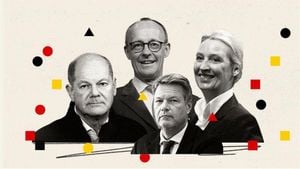On February 24, 2025, President Emmanuel Macron of France and U.S. President Donald Trump met at the White House on the pivotal third anniversary of Russia's invasion of Ukraine. The meeting highlighted the complicated dynamics of international relations, especially as both leaders sought to navigate the path toward peace amid differing viewpoints on the war's future and Europe's support for Ukraine.
Macron's visit marked him as the first European leader to be welcomed at the White House during Trump’s second term. It began shortly after 12 PM local time, where discussions centered on the shared goal of establishing lasting peace within Ukraine. Macron made it clear, stating, "We do share the objective of peace but we are very aware of the necessity to have guarantees and solid peace to stabilize the situation." He expressed Europe's readiness to go beyond just verbal support, advocating for military involvement as peacekeepers once hostilities cease.
"We are ready to provide security guarantees to Ukraine, including peacekeepers, once there’s a ceasefire," Macron said, emphasizing Europe's commitment to Ukraine's sovereignty and stability. Trump, who appeared to support the notion of European forces, mentioned he had previously discussed the deployment of peacekeeping troops with Russian President Vladimir Putin, asserting Putin was open to such arrangements.
While Trump reiterated his longstanding belief he could end the conflict within weeks, he sparked tense moments during the press briefing with his commentary on the European financial contribution to Ukraine’s defense. "Europe is loaning money to Ukraine. They’re getting their money back," Trump claimed, which prompted Macron to interject by stating, "No, frankly, we paid 60% of the total effort. It was like the US: loans, guarantees, grants." Macron’s correction highlighted the nuances often lost amid Trump’s statements about the war effort.
The backdrop of their meeting was fraught with challenges, including skepticism among European allies concerning Trump's inconsistent stance on Ukraine. Macron's efforts to build a unified European approach to security and support for Ukraine have gained urgency, particularly as Trump continues to express unguarded criticisms of Ukrainian leadership.
Despite the tensions, both leaders have recognized the importance of cooperation. Trump remarked, as the press conference concluded, "A lot of progress has been made" toward ending the conflict, with both parties expressing hope for the future. During their two-hour virtual meeting with G7 leaders earlier, they also addressed the pressing issue of frozen Russian assets and their potential role as leverage in future peace negotiations. Russia's assets, amounting to $230 billion, are now set to be part of talks surrounding any agreements.
At the crux of this diplomatic dialogue was the mention of an upcoming meeting between Trump and Ukrainian President Volodymyr Zelensky, intended to establish agreements concerning Ukraine's rich mineral resources, which are pivotal for any deal involving U.S. security guarantees.
Responding to reporters about the Ukraine war's management and Europe's role, Trump said, "The cost and burden of securing peace must be borne by European nations, not solely by the United States". This perspective raised eyebrows among European leaders, concerned it could result in weakened commitments to Ukraine. Observers speculate Trump's push for swift peace could sideline significant interests for Ukraine, raising the stakes around the negotiations.
Adding to the complexity, Democratic critiques of Trump have intensified, particularly following his recent derogatory remarks about Zelensky, which have raised alarm on both sides of the Atlantic. EU officials worry Trump's approach may undermine the sovereignty of Ukraine and convey disinterest during sensitive negotiations.
Macron's relations with Trump, which had previously been described as cordial but complicated, were brought to the fore as he sought to steer the conversation. He made it clear during their discussions how important it is for the U.S. to resist compromising Ukraine's standing during negotiations and to advocate decisively against Russian aggression.
"I intend to tell Trump during our talks why it is jointly beneficial for Americans and Europeans not to show weakness to Putin during any U.S.-led negotiations to conclude the war," Macron emphasized, trying to ground the talks within the larger transatlantic alliance’s framework.
Despite these diplomatic hurdles, Macron's push for European strategic autonomy resonates within European circles. Rachel Rizzo, from the Atlantic Council's Europe Center, noted the meeting could herald constructive steps toward actual progress on peace for Ukraine, especially if the focus shifts to longer-term security guarantees. "Macron’s willingness to discuss peacekeepers is heartening, and Trump's acceptance could lead to pivotal changes," she asserted.
Overall, the meeting underscored the necessity of collaboration and the challenges lying ahead. With the war still looming large over international relations and lasting repercussions for geopolitical stability, both leaders face the monumental task of aligning their countries' positions on Ukraine and ensuring effective cooperation within their respective alliances. The world will undoubtedly keep watch as negotiations proceed, anxiously awaiting developments.”



